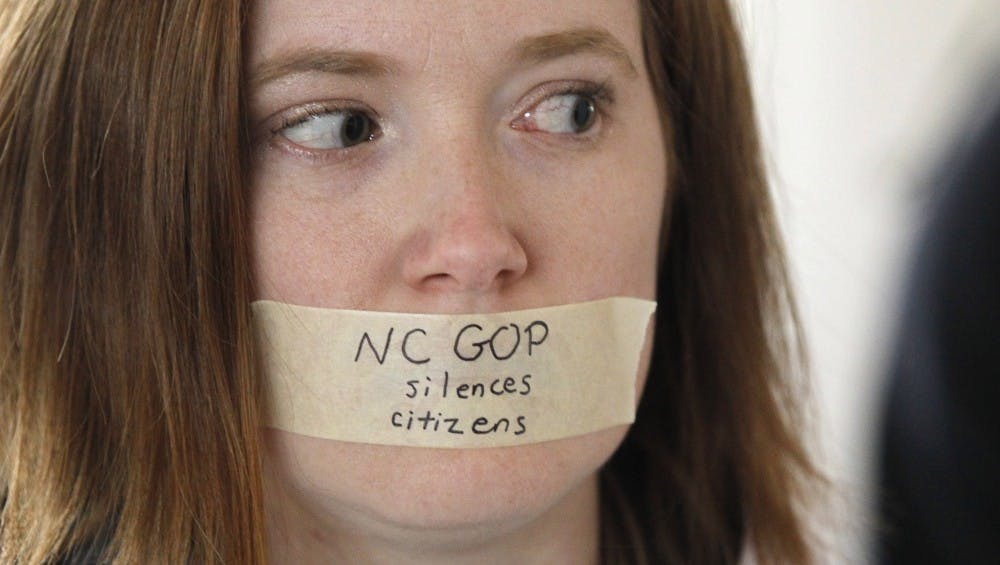Shuffling his snowy inauguration ceremony inside seems trivial compared to what new North Carolina Gov. Roy Cooper has already endured.
The divisiveness of the gubernatorial race seeped into the new year. Before even settling into the Governor’s Mansion, Cooper was already at odds with his legislative body.
The North Carolina General Assembly proposed an unprecedented motion in December to stifle the incoming Cooper’s power regarding state Supreme Court selections and election board requirements, among other things. Headed by then-Gov. Pat McCrory, the GOP-controlled State Congress swiftly pushed these legislative acts during a mysterious special session for Hurricane Matthew damage relief. Almost a week of debate was trenched with public protests, and arrests of journalists and private citizens alike were prevalent. Jonathan Jones, instructor in the Elon University School of Communications and director of the North Carolina Open Government Coalition, says this precedent can be a dangerous one in the future
“I think partisans can look at what’s happened at North Carolina, and if you have a particular viewpoint, you see North Carolina as a great success story,” Jones said. “A very specific agenda can be accomplished here, and if you’re trying to accomplish that in another state or maybe the national level, then I’d think you’d have to ask if you can repeat that elsewhere. That gives me great concern about seeing these tactics used more broadly.”
Jones said the General Assembly was legally warranted to call the surprise special session. But he implied it was unethical because the hatefulness allotted citizens “little opportunity to make their voice heard to their legislators.” When citizens denounced what was transpiring, they were met with handcuffs.
That outraged Jones.
At least 39 people were arrested, including NC Policy Watch reporter Joe Killian, a personal friend of Jones.
The GOP cited these arrests as public disturbances of legislative assemblies, which Jones somewhat agreed with. But he said there could have been a more effective way to handle the situation by only removing certain unruly characters and not those who were peacefully observing. Because of this, Jones believes the legislature violated the “Open Meeting Law,” which requires “that most meetings of public bodies be held in public,” which is written in Chapter 143 of the North Carolina. General Assembly bylaws.
“Citizens have a First Amendment right to be heard, and that includes the right to assemble and the right to speak in public places,” Jones said. “The legislature took it a step too far and removed everyone. That is really deeply concerning to me. […] When you have citizens being removed from government action that they’re entitled to witness, then I think democracy is failing.”
Caught up with @jonesjd to talk about the effects of NC's general assembly meeting in December. Full story will be out tomorrow. pic.twitter.com/mwKYBBmFAP
— Emmanuel Morgan (@_EMorgan704) January 16, 2017
Elon sophomore Jacob Allen said he paid attention to the chaos transpiring in Raleigh, but did not completely understand it. Though he is an out-of-state student from New Jersey, he said this was concerning to him because it could affect him later.
“I just don’t get it,” Allen said. “If the roles were switched, I don’t think the people who were doing this would want that happen to them.”
Jones agreed with Allen, saying that the legislative bodies of North Carolina were indirectly curtailing the power of the people by draining influence from Cooper, who was fairly chosen by the electorate. Because of this, Jones said it is up to the people to remain socially active in order to prevent a similar instance from happening. This includes voting and being cognizant of the latest news.
“I think its important for citizens to get engaged, whatever their viewpoint,” Jones said. “We’ve reached a point in our political culture — in our political life — where being silent, sitting on the side and allowing others to make their voices heard, is not an option if you want to live in a just society. I think people need to let their politicians know about how they feel about important issues and hold their politicians accountable.”


